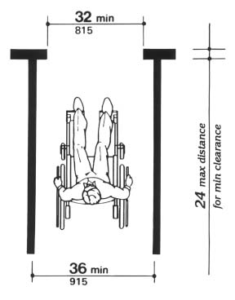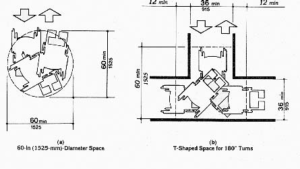This is a question I ask when checking out new vacation locations or even when planning on visiting a local place. I often hear from people, “Of course it’s accessible…it has to be its the law!” When I hear that, I have to chuckle; there have been many occasions where I have been told that something was accessible or “wheelchair friendly” only to arrive and discover that is not the case at all.
 When my son was younger and I was just learning about the different ideas of what is assessable and what is not. We decide to use our timeshare and stay up in the mountains at a hotel. This would have been one of our first family vacations that didn’t involve staying at a family member’s place. We showed up all excited to be on vacation; only to find out that the hotel’s idea of wheelchair accessible involved a couple of steps, a smaller than code door, and many other problems. Luckily my son was still small and not in a powerchair just yet. We made it work but this made me think “Why do I have to make it work?”. This was the last time that we used our timeshare because it was obvious I couldn’t let just anyone book our trips without double-checking and asking specific questions.
When my son was younger and I was just learning about the different ideas of what is assessable and what is not. We decide to use our timeshare and stay up in the mountains at a hotel. This would have been one of our first family vacations that didn’t involve staying at a family member’s place. We showed up all excited to be on vacation; only to find out that the hotel’s idea of wheelchair accessible involved a couple of steps, a smaller than code door, and many other problems. Luckily my son was still small and not in a powerchair just yet. We made it work but this made me think “Why do I have to make it work?”. This was the last time that we used our timeshare because it was obvious I couldn’t let just anyone book our trips without double-checking and asking specific questions.
As a Mom of a powerchair user, I will investigate to the full extent, asking questions that the everyday person may not think to ask. And I don't feel bad asking for pictures and reading reviews.
How wide is the door entrance?
 Doorways need to be wide enough to ensure ample space for a wheelchair to maneuver through openings. Some codes require 34-inch-wide exterior doors and 32-inch-wide interior doors. The Americans with Disabilities Act (ADA) requires doorways to have a minimum of 32 inches of width with the door open.
Doorways need to be wide enough to ensure ample space for a wheelchair to maneuver through openings. Some codes require 34-inch-wide exterior doors and 32-inch-wide interior doors. The Americans with Disabilities Act (ADA) requires doorways to have a minimum of 32 inches of width with the door open.
If the place is older this is even more of an important question. They may classify themselves and assessable but in reality they have been grandfathered in and should not be using that term.
Is there enough floor space for movement?
 The space required for a wheelchair to make a 180-degree turn is a clear space of 60 in (1525 mm) diameter or a T-shaped space.
The space required for a wheelchair to make a 180-degree turn is a clear space of 60 in (1525 mm) diameter or a T-shaped space.
I’ve been know to ask if they can remove a coffee table or chair to make extra room. I have also redecorated a room to provide extra moving room for the wheelchair.
Can the chair be parked beside the bed, and does the charger still reach a plug?
This is one of those things that I don’t believe is an ADA rule but it is something that if you are in a powerchair you will appreciate. And remember that on many cruises and if you travel abroad extension cords are not always an option.
What way does the bathroom door swing in or out?
- If the door swings in will you be able to shut it behind you once in the room?
- If it swings in will you be able to clear it to enter the room?
- How high is the bed? What’s the clearance under the bed? (room for a Hoyer lift)
- Will you be able to use a slide board or swing yourself into the bed?
Is the bed height adjustable?
This is something that I wish hotels thought about while making accessible rooms.
The ADA has not made a mandatory bed height; most beds in hotels are averaging about 30” for floor too mattress top.
Can the legs of a Hoyer lift fit under the bed or is it a platform bed? I have noticed that platform beds are becoming more popular.
Are there stairs or even a step up to enter location? Ramp?
Look beyond the entrance to the location. What about getting around the resort or even getting to the room. 
- Proper amenities?
- Pool: is there a lift/ramps/paved walkways?
- Ask about a water wheelchair; this has lately become something that I see more and more. What a great idea! They have a water wheelchair and a ramp to enter the pool. Hopefully, this will become a more popular option.
- Shuttle: Does it have a lift?
- I recently discovered that if you ask, “What are the other options?” they normally will offer to cover the cost of a wheelchair taxi Or they have other options.
- Pool: is there a lift/ramps/paved walkways?
The ADA states that hotels have to offer “equivalent serves”, meaning that if it is offered to one it needs to be offered to all. “The important thing to remember is that the service provided must be equivalent. If customers without disabilities can get transportation quickly and easily, people with disabilities deserve equivalent service. The services offered to people with disabilities must be as convenient as the services offered to other people in terms of fares, schedules or response times, hours of operation, pick-up and drop-off locations, and other measures of equivalent service.”
Many cities do not have accessible taxis available and this can lead to some bad situations for the traveler. Spending the night in an airport is never a fun option.

These questions will vary depending on your needs, but questions will need to be asked if you are using a travel agent or booking yourself. If you use a travel agent you use one that understands and know the questions to ask you so that they can ask the right questions to the hotel/resort. Do not assume that they know your needs. Even as a mom of a wheelchair user and a travel agent I always ask certain questions but I want to hear what you use/need daily. Share your needs and no need is too small while it might not be how you normally would do it at home (flexibility is key here) there should be a way to make sure that your needs are met.